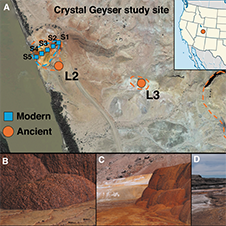Link to online paper: https://www.liebertpub.com/doi/full/10.1089/ast.2022.0139
Abstract
In recent years, strong evidence has emerged indicating the potential habitability of the subsurface of Mars. Occasional discharge events that bring subsurface fluids to the surface may carry with them the biological traces of subsurface organisms. Similar events are known to take place on Earth and are frequently associated with long-term mineralogical preservation of organic material, including DNA. Taking advantage of this process may allow for the development of life-detection strategies targeting biosignatures from the more habitable subsurface environment without the need for direct subsurface exploration. To test the potential for this approach to life-detection, we adapted a protocol to extract microbial DNA preserved in carbonate rocks and tested its efficacy in detecting subsurface organisms at a Mars analog site in southeastern Utah, USA, using samples from ancient and modern carbonate deposits associated with natural and artificial springs. Our results indicated that DNA from deep-subsurface organisms preserved in carbonate deposits can remain recoverable for up to 100,000 years, supporting life-detection strategies based on the detection of deep-subsurface biosignatures in surface-exposed rocks on Mars.
